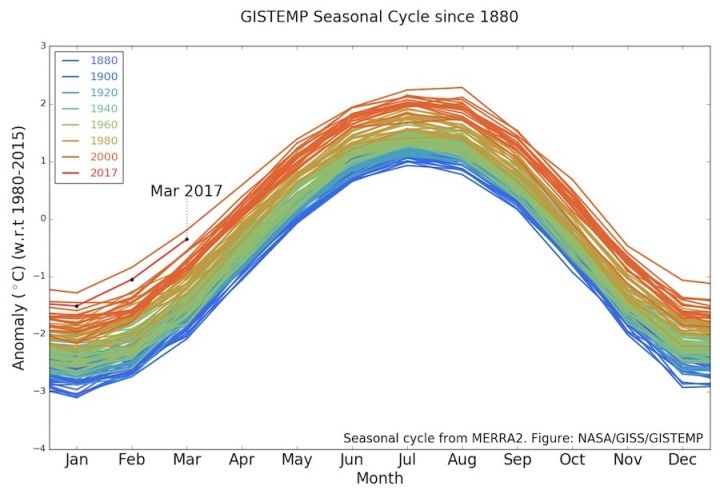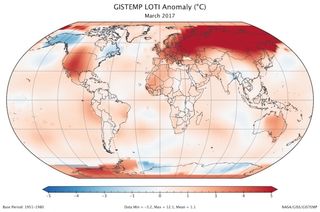March Was Second Hottest on Record Globally

The exceptional global heat of the past few years continued last month, with March ranking as the second hottest on record for the planet. It followed the second hottest February and third hottest January, showing just how much Earth has warmed from the continued buildup of heat-trapping greenhouse gases in the atmosphere.
March was 2.02 degrees Fahrenheit (1.12 degrees Celsius) warmer than the 1951-1980 average, according to NASA data released Friday. It ranks behind only March 2016, which was 2.29 degrees Fahrenheit (1.27 degrees Celsius) above that same average. NASA's global temperature records extend back 137 years.
While global temperatures in 2016 received a small boost from an exceptionally strong El Niño — which features warmer-than normal ocean waters in the eastern tropical Pacific — the majority of the temperature rise is due to human-caused global warming.
Current levels of carbon dioxide — the main greenhouse gas driving up global temperatures — are unprecedented in human history, and if they continued unabated, could reach a level not seen in the atmosphere in 50 million years, according to a recent study.
Heat Is On for 2017, Just Not Record-Setting Global Heat Continues With Second-Hottest February The Climate Could Hit a State Unseen in 50 Million Years
Since the beginning of the Industrial Revolution, carbon dioxide levels have risen from about 280 parts per million to more than 400 ppm. Those levels are expected to top 410 ppm in the next few weeks.
While 2017 isn't expected to top 2016 as the hottest year on record globally, in part because El Niño has dissipated (though there are some signs it could return later this year), it is still likely to rank among the hottest years, according to projections from the U.K. Met Office.
Sign up for the Live Science daily newsletter now
Get the world’s most fascinating discoveries delivered straight to your inbox.
So far, global temperatures this year are on track with those projections, Adam Scaife, head of long-range prediction at the Met Office, said.
"We have said a number of times now that we would likely see three record years in a row and then another very warm, but perhaps not record year, in 2017, so the small number of data we have so far for 2017 also concur with that," he said in an email last month.

Of the 17 hottest years on record, 16 have occurred in the 21st century (the exception was the strong El Niño year of 1998), according to the National Oceanic and Atmospheric Administration. The five warmest years have all occurred since 2010, according to NOAA, which will release its own global temperature data for March on April 19.
So far this year NOAA's rankings have agreed with NASA's.
You May Also Like: NOAA Is Still Lacking an Administrator to Lead Agency Early Heat Wave Bakes India, Sign of What’s to Come Carbon Emissions Factor Into Major Oil Sands Shakeup Hey Look, Another Record Low Month for Sea Ice
Originally published on Climate Central.

Andrea Thompson is an associate editor at Scientific American, where she covers sustainability, energy and the environment. Prior to that, she was a senior writer covering climate science at Climate Central and a reporter and editor at Live Science, where she primarily covered Earth science and the environment. She holds a graduate degree in science health and environmental reporting from New York University, as well as a bachelor of science and and masters of science in atmospheric chemistry from the Georgia Institute of Technology.












